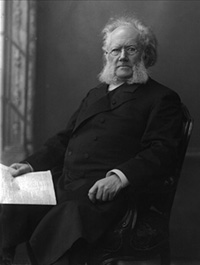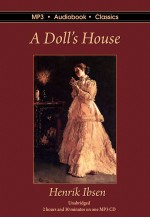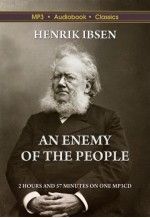Henrik Ibsen
 |
Henrik Ibsen (March 20, 1828 – May 23, 1906) is widely regarded as the most important playwright since William Shakespeare. His best known works include A Doll’s House, Hedda Gabler, Ghosts, Peer Gynt, The Wild Duck and An Enemy of the People, and he is the most frequently performed dramatist after Shakespeare. He is often called “the father of realism” and is one of the founders of Modernism in the theatre. He was born into a well-connected merchant family in the seaport town of Skien, Norway that experienced serious financial difficulties when he was a young boy. Much of his work is shaped by the dark secrets and moral conflicts of families keeping up appearances, with a particular focus on the suffering of women. He left school at age 15, apprenticed as a pharmacist for a time, fathered an illegitimate child, and moved to Oslo, where he tried unsuccessfully to enter the university. He began writing plays in his early 20’s, moving to Bergen, where he became deeply involved in all aspects of the theatre and began to write, achieving recognition with Brand in 1865 and Peer Gynt in 1868. He left Norway in 1861 and spent 27 years in Italy and Germany during his most productive years, returning to Norway in 1891. As he matured his work generated considerable controversy for its exposure of hypocritical social values, but he went beyond these concerns in his late period with more complex and introspective works. He was nominated for the Nobel Prize in literature in 1902, 1903, and 1904. |
A Doll's House
A Doll’s House aroused a great deal of controversy when it premiered at the Royal Theatre in Copenha..
$9.99
An Enemy of the People
The term “enemy of the people” has entered our modern lexicon, thanks to the unprecedented attacks o..
$9.99


